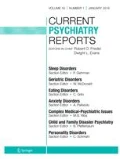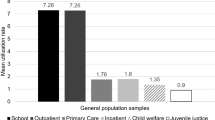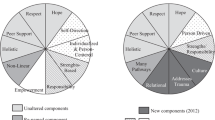Abstract
Purpose of Review
Assisted outpatient treatment (AOT) is an outpatient court-ordered treatment for people with severe mental illness (SMI) whose care needs are often unmet in the community due, in part, to treatment non-adherence. AOT is controversial, and the goal of this review is to provide an update on recent research, the status of AOT in the United States, and future directions for research and implementation.
Recent Findings
Several recent studies have demonstrated that it is not just a lack of access to appropriately intensive care that prevents some individuals with SMI from engaging in and benefiting from treatment and that AOT can improve engagement and patient outcomes over and above the provision of care.
Summary
The future of AOT in the United States is still somewhat uncertain and will largely depend on the effectiveness and sustainability of the SAMHSA AOT grant programs. Future research efforts should investigate the conditions under which and for whom AOT can be most effective, to help avoid poor outcomes for this vulnerable population.
Similar content being viewed by others
References
Papers of particular interest, published recently, have been highlighted as: • Of importance
Binder R. Assisted outpatient treatment: APA’s position statement. Psychiatric News. 2016:29. https://doi.org/10.1176/appi.pn.2016.3a19.
Swartz MS, Bhattacharya S, Robertson AG, Swanson JW. Involuntary outpatient commitment and the elusive pursuit of violence prevention. Can J Psychiatr. 2017;62(2):102–8.
Swanson JW, Swartz MS. Why the evidence for outpatient commitment is good enough. Psychiatr Serv. 2014;65(6):808–11.
Burns T, Rugkasa J, Molodynski A, Dawson J, Yeeles K, Vazquez-Montes M, et al. Community treatment orders for patients with psychosis (OCTET): a randomised controlled trial. Lancet. 2013;381(9878):1627–33.
Steadman HJ, Gounis K, Dennis D, Hopper K, Roche B, Swartz M, et al. Assessing the New York City involuntary outpatient commitment pilot program. Psychiatr Serv. 2001;52(3):330–6.
Swartz MS, Swanson JW, Wagner HR, Burns BJ, Hiday VA, Borum R. Can involuntary outpatient commitment reduce hospital recidivism?: findings from a randomized trial with severely mentally ill individuals. Am J Psychiatry. 1999;156(12):1968–75.
Rugkasa J. Effectiveness of community treatment orders: the international evidence. Can J Psychiatr. 2016;61(1):15–24.
Wolff N. Using randomized controlled trials to evaluate socially complex services: problems, challenges and recommendations. J Ment Health Policy Econ. 2000;3(2):97–109.
Segal AG, Sisti DA. “Restricted community members”: research protections and opportunities for individuals committed to assisted outpatient treatment. Psychiatr Serv. 2017;68(2):189–91.
• O’Reilly R, Vingilis E. Are randomized control trials the best method to assess the effectiveness of community treatment orders? Admin Pol Ment Health. 2018;45(4):565–74 Propose several alternative models for research design using theory-based approaches which could provide a more nuanced understanding of an AOT program.
• Schneeberger AR, Huber CG, Lang UE, Muenzenmaier KH, Castille D, Jaeger M, et al. Effects of assisted outpatient treatment and health care services on psychotic symptoms. Soc Sci Med 2017;175:152–60. Results suggest the positive effect AOT has on psychotic symptoms is related to the availability of mental healthcare service use, further suggesting that AOT is more effective with greater use of and engagement with intensive services.
• O’Reilly R, Corring D, Richard J, Plyley C, Pallaveshi L. Do intensive services obviate the need for CTOs? Int J Law Psychiatry 2016;47:74–8. Findings support the idea that within the SMI population, there are groups of people who may require mandated supervision, such as AOT, to adhere to treatment.
• Segal SP, Hayes SL, Rimes L. The utility of outpatient commitment: acute medical care access and protecting health. Soc Psychiatry Psychiatr Epidemiol. 2018;53(6):597–606 Findings suggest that accessibility of care is not the sole reason why persons with SMI fail to receive adequate physical health care.
• Meldrum ML, Kelly EL, Calderon R, Brekke JS, Braslow JT. Implementation status of assisted outpatient treatment programs: a national survey. Psychiatr Serv. 2016;67(6):630–5 Describes the actual operation of AOT programs in practice in the United States in 2014.
SAMHSA awards up to $54 million for the Assisted Outpatient Treatment Program to help address the need of people who have experienced serious mental illness [press release]. 9 September 2016. https://www.samhsa.gov/newsroom/press-announcements/201609091230.
Protecting Access to Medicare Act of 2014, Pub. L. No. 113-93 Stat. 1040 (1 April 2014).
Assisted Outpatient Treatment Grant Program for Individuals with Serious Mental Illness [grant announcement]. 18 April 2016. https://www.samhsa.gov/grants/grant-announcements/sm-16-011.
Swartz MS, Hoge SK, Pinals DA, Lee E, Lee L, Sidor M, et al. Resource document on involuntary outpatient commitment and related programs of assisted outpatient treatment. APA resource document. American Psychiatric Association. October 2015. <apapsy.ch/involuntary>.
Author information
Authors and Affiliations
Corresponding author
Ethics declarations
Conflict of Interest
Stephanie N. Cripps declares no conflict of interest.
Marvin S. Swartz has received a grant from RTI and personal fees from PRA Inc.
Human and Animal Rights and Informed Consent
This article does not contain any studies with human or animal subjects performed by any of the authors.
Additional information
This article is part of the Topical Collection on Public Policy and Public Health
Rights and permissions
About this article
Cite this article
Cripps, S.N., Swartz, M.S. Update on Assisted Outpatient Treatment. Curr Psychiatry Rep 20, 112 (2018). https://doi.org/10.1007/s11920-018-0982-z
Published:
DOI: https://doi.org/10.1007/s11920-018-0982-z




